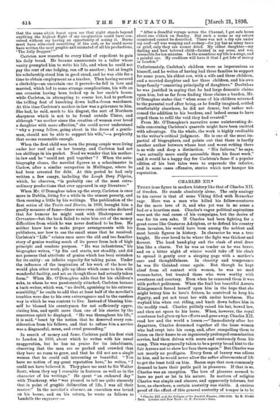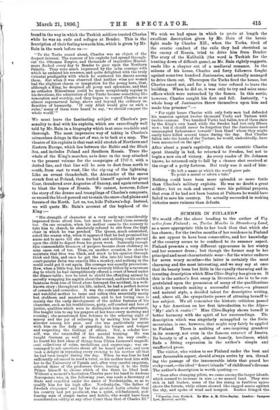CHARLES XII.*
THERE is no figure in modern history like that of Charles XII. of Sweden. He stands absolutely alone. The only analogy to his career is that of some Viking filled with Berserker rage. Here was a man who killed his fellow-creatures for the mere love of it, and who yet was in no sense a bad or a heartless man. Charles's vague political aspirations were not the real cause of his campaigns, but the desire of war for its own sake. If Charles had been fighting for a great cause like Gustavus Adolphus, or to defend his country from invasion, his would have been among the noblest and most heroic figures in history. In character he was a true knight. He ever loved to be where the fight was thickest and fiercest. The hard hand-play and the clash of steel drew him like a charm. Yet he was as tender as be was brave, and on a bitter night of winter would take off his cloak to spread it gently over a sleeping page with a mother's care and thoughtfulness. In chastity and temperance he was Sir Galahad come again. But though he kept aloof from all contact with women, be was no mad woman-hater, but treated those who were worthy with sweetness and courtesy. Even when he censured them it was with perfect politeness. When the frail but beautiful Aurora Konigsmarck forced herself upon him in the hope that she might betray him to love's fetters, he contrived to keep his dignity, and yet not treat her with undue harshness. She waylaid him when out riding, and knelt down before him in the muddy road. Charles politely raised his hat, bowed low, and then set spurs to his horse. When, however, the royal courtesan had given up her efforts and gone away, Charles XII. read her and the world a lesson :—" Immediately after her departure, Charles drummed together all the loose women who had crept into his camp, and, after compelling them to listen on their knees to an ingeniously prolonged commination service, had them driven with scorn and contumely from his camp. This was generally taken to be a pretty broad hint to the fair Aurora not to show her face there again." But Charles was not merely no profligate. Every form of luxury was odious to him, and he would never allow the softer allurements of life to get the least hold on him. Bacon says that men commonly demand to have their perils paid in pleasures. If that is so, Charles was an exception. The love of pleasure seemed to have no part or lot in his nature. In matters of religion Charles was simple and sincere, and apparently tolerant, but here, as elsewhere, a certain austerity was visible. A curious proof of the effect of this general austerity of temper is to be • Charles JUL and the Collapse of the Swedish Empire, 1682-1719. By B. Nisbet Bain. London and New York : G. P. Putnam's Sons. found in the way in which the Turkish soldiers treated Charles while he was an exile and refugee at Bender. This is the description of their feeling towards him, which is given by Mr. Balm in the work before us :— " To the Turks round about, Charles was an object of the deepest interest. The rumour of his exploits had spread through- out the Ottoman Empire, and thousands of inquisitive Mussul- mans flocked every day to Bender to gaze upon the Northern Paladin. They were much impressed by the calm courage with which he endured his reverses, and quite delighted with the truly Oriental prodigality with which he scattered his ducats among them. But when it was observed that neither wine nor women had the slightest charm or temptation for the young hero, that, although a King, he despised all pomp and splendour, and that no orthodox Mussulman could be more scrupulously regular in his devotions, the admiration of the Turks became something like veneration and worship, and they began to regard Charles as an almost supernatural being, above and beyond the ordinary in- firmities of humanity. • If only Allah would give us such a ruler,' many of them were heard to say, 'we should conquer the whole world.'" We must leave the fascinating subject of Charles's per- sonality to deal with his exploits, which are exceedingly well told by Mr. Bain in a biography which is at once readable and thorough. The most impressive way of taking in Charles's miraculous doings in the art of war, is to look at a map. The theatre of his exploits is that vast wild stretch of Northern and Eastern Europe, which lies between the Baltic and the Black Sea, and includes Poland and Southern Russia. Trace the whole of the King's marches, as is done in the map attached to the present volume for the campaigns of 1707-9, with a dotted line, and that line will be seen to dart from north to south, from east to west, like the zig-zag of the lightning. Like an errant thunderbolt, the Alexander of the snows struck first at Poland, then hurled himself against the great Czar, thundered over Augustus of Saxony, and again returned to blast the hopes of Russia. We cannot, however, follow the story of the drums and trampling° of Charles's conquests, or record the blood poured out to stain the snow-clad plains and forests of the North. Let us, too, hide Pultawa's day. Instead, we will quote Mr. Bain's account of the boyhood of the King :— " His strength of character at a very early age considerably impressed those about him, but must have tried them severely too. On one occasion, when his mother came to the nursery to take him to church, he absolutely refused to stir from the high chair in which he was perched. The Queen, much astonished, asked the reason why, when it appeared that be had promised his nurse not to move till she came back and nothing could prevail upon the child to depart from his given word. Naturally enough this commendable firmness of purpose became sheer obstinacy in nine cases out of ten. Thus, on another occasion, he chose to maintain that blue was black, and stuck to his opinion through thick and thin, and once he got the idea into his head that the court-painter Rahn was exactly like a monkey, and nothing in the world could get it out again. His courage was equally precocious. How, when a little boy, his hand was severely bitten by &ravenous dog to which he had surreptitiously offered a crust of bread under the dinner-table ; how he tried to shield the offending animal by secretly wrapping his napkin about the wound, and how his sudden faintness from loss of blood alone betrayed the accident, is a well- known story ; throughout his life, indeed, he had a perfect horror of cowards and cowardice. It was the constant aim of his wise and watchful mother to tame and soften this essentially manly but stubborn and masterful nature, and to her loving care is mainly due the early development of the nobler features of his character, such as his truthfulness, piety, self-control and love of justice, qualities which were to distinguish him ever afterwards. She taught him to say his prayers at her knee every morning and evening ; she accustomed him betimes to the sobering sight of misery and the joy of relieving it by making him her little almoner among her poor, and she was particularly urgent with him on the duty of guarding his tongue and temper and respecting the feelings of others. Nor, a scholar her- self, was she unmindful of his mental training. He was taught German as well as Swedish from his very cradle ; he learnt his first ideas of things from Ulrica Leonora's magnifi- cent collections of coins, medallions and engravings ; was en- couraged to ask questions about all he heard and saw, and soon took a delight in repeating every evening to his mother all that he had been taught during the day. When he was four he had 4a. sufficiently advanced to need a tutor, so his mother took him with her to the University of Upsala and, after very careful enquiries, selected three of the professors there, leaving it to the little Prince himself to choose which of the three he liked best. Without a moment's hesitation Charles gave his hand to Andreas Norcopensis who, in the following year, was made a Secretary of State and ennobled under the name of Nordenhjelm, so as to qualify him for his high office. Nordenhjelm the father of Swedish eloquence' and by far the greatest Latin scholar that his country had yet produced, was a quiet, old-fashioned, god- fearing man of simple tastes and habits, who would have been considered an oddity at any other Court than that of Charles XL"
We wish we had apace in which to quote at length the excellent description given by Mr. Bain of the heroic fight made by Charles 1111., when the Turks, tired of the erratic conduct of the exile they had cherished as the enemy of Russia, tried to drive him from Bender. The story of the Kalibalik (the word is Turkish for the hunting down of difficult game), as Mr. Bain rightly suggests, reads like a chapter out of a media3val romance. In the saloons of his house, Charles and forty followers fought against some two hundred Janissaries, and actually managed to drive them out. Thereupon the Turks fired the house, but Charles cared not, and for a long time refused to leave the building. When he did so, it was only to try and seize some offices which were untouched by the flames. In this sortie, however, Charles caught his foot and fell. Instantly, "a whole heap of Janissaries threw themselves upon him and made him prisoner "
" For eight hours Charles with only forty men had defended his mansion against twelve thousand Turks and Tartars with twelve cannons. Two hundred Turks had fallen, ten of them slain by the King's own hand, while the Swedes had lost only fifteen men ; but it should never be forgotten that the Janissaries used unexampled forbearance towards Iron Head ' whom they might easily have killed several times during the day. Had Charles fallen into the hands of the Tartars, he would, undoubtedly, have been massacred on the spot."
After about a year's captivity, which the eccentric Charles spent literally in bed, he returned to Sweden, but not to begin a new era of victory. As every reader of Dr. Johnson knows, he returned only to fall by a chance shot received at the siege of a petty fortress. But truly was it said of him :
"He left a name at which the world grew pale To point a moral or adorn a tale."
Nothing could have been more splendid or more futile than Charles's military exploits. He was no doubt a great soldier; but 80 rash and unreal were his political projects, that even if he had not been beaten at Pultawa he would have failed to save his country. He actually succeeded in making victories more ruinous than defeats.







































 Previous page
Previous page